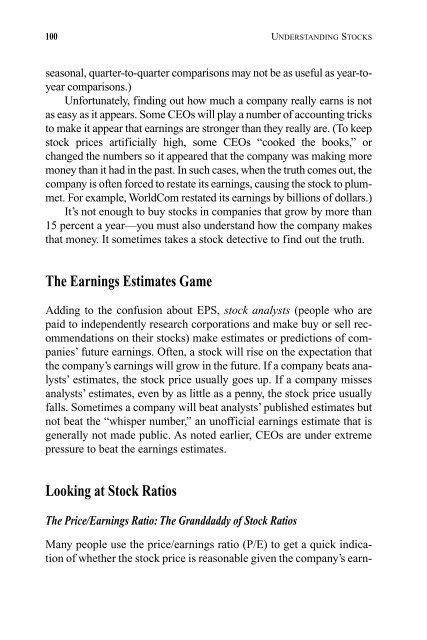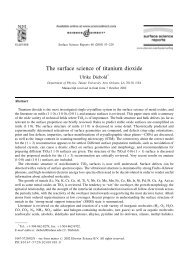Understanding Stocks
Understanding Stocks
Understanding Stocks
You also want an ePaper? Increase the reach of your titles
YUMPU automatically turns print PDFs into web optimized ePapers that Google loves.
100 UNDERSTANDING STOCKS<br />
seasonal, quarter-to-quarter comparisons may not be as useful as year-toyear<br />
comparisons.)<br />
Unfortunately, finding out how much a company really earns is not<br />
as easy as it appears. Some CEOs will play a number of accounting tricks<br />
to make it appear that earnings are stronger than they really are. (To keep<br />
stock prices artificially high, some CEOs “cooked the books,” or<br />
changed the numbers so it appeared that the company was making more<br />
money than it had in the past. In such cases, when the truth comes out, the<br />
company is often forced to restate its earnings, causing the stock to plummet.<br />
For example, WorldCom restated its earnings by billions of dollars.)<br />
It’s not enough to buy stocks in companies that grow by more than<br />
15 percent a year—you must also understand how the company makes<br />
that money. It sometimes takes a stock detective to find out the truth.<br />
The Earnings Estimates Game<br />
Adding to the confusion about EPS, stock analysts (people who are<br />
paid to independently research corporations and make buy or sell recommendations<br />
on their stocks) make estimates or predictions of companies’<br />
future earnings. Often, a stock will rise on the expectation that<br />
the company’s earnings will grow in the future. If a company beats analysts’<br />
estimates, the stock price usually goes up. If a company misses<br />
analysts’ estimates, even by as little as a penny, the stock price usually<br />
falls. Sometimes a company will beat analysts’ published estimates but<br />
not beat the “whisper number,” an unofficial earnings estimate that is<br />
generally not made public. As noted earlier, CEOs are under extreme<br />
pressure to beat the earnings estimates.<br />
Looking at Stock Ratios<br />
The Price/Earnings Ratio: The Granddaddy of Stock Ratios<br />
Many people use the price/earnings ratio (P/E) to get a quick indication<br />
of whether the stock price is reasonable given the company’s earn-

















